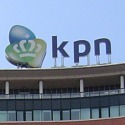KPN Buoyed by Cost Savings, Consumer Growth
Dutch incumbent struggles in business and wholesale markets but is making good progress on cost savings and at its consumer operation.

Dutch telecom incumbent KPN has blamed a disappointing performance in its business and wholesale markets for a slight dip in revenues in the second quarter, but still managed to boost earnings thanks to cost-saving efforts and growth at its consumer business.
KPN Telecom NV (NYSE: KPN) saw total revenues fall by 2.1% in the April-to-June quarter, to about €1.6 billion ($1.9 billion), compared with the year-earlier period, while its adjusted EBITDA was up 2.2%, to €601 million ($699 million).
In a statement, the operator said its top line had been hit by difficulties across business and wholesale markets, which together account for about 44% of its sales.
Business revenues have dropped as customers have ditched traditional telco services and taken advantage of new technologies as well as bundles of fixed and mobile services, said KPN. It also blamed a "highly competitive mobile-only market" for pressure on revenues.
"We still have to improve customer satisfaction in business towards a positive level and we continue to experience strong price competition in mobile in our large enterprise and corporate segment," said CEO Eelco Blok in a company statement.
Like other European incumbents, KPN sees cloud and security services as potential opportunities in the enterprise sector, but its activities here have yet to spur growth.
It blamed falling wholesale revenues on lower international traffic as well as "competitive dynamics in the Dutch mobile market leading to lower revenues from MVNOs."
For all the latest news from the wireless networking and services sector, check out our dedicated mobile content channel here on Light Reading.
More encouragingly, KPN managed to grow its Dutch consumer revenues by 2.1%, to €784 million ($912 million), thanks to an overhaul of its offerings and greater focus on the sale of "converged" services, which bundle various fixed and mobile products in a single bill.
"In the competitive consumer market we are differentiating with a targeted household approach," said Blok. "Our market leading propositions that offer freedom of choice and our targeted marketing are generating increasing value per household."
Cost-saving efforts also buoyed profitability. Thanks partly to investments in a new IT system, KPN was able to reduce operating expenses in the Netherlands by 4.2%, to €858 million ($998 million), compared with the year-earlier period.
That reduction combined with lower depreciation and amortization charges led to a 35% year-on-year increase in profit for the period, to €191 million ($222 million).
KPN confirmed its full-year outlook of generating adjusted EBITDA "in line with 2016" and said it still expected to invest about €1.15 billion ($1.34 billion) in capital expenditure, down from about €1.2 billion ($1.4 billion) last year.
KPN's share price was trading up about 4% in Amsterdam at the time of publication.
— Iain Morris, 

 , News Editor, Light Reading
, News Editor, Light Reading
Read more about:
EuropeAbout the Author(s)
You May Also Like












